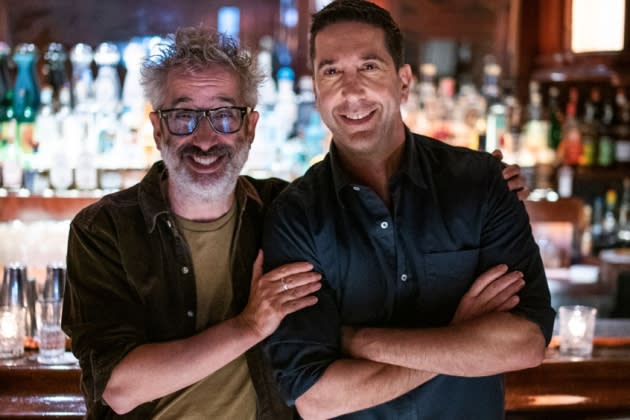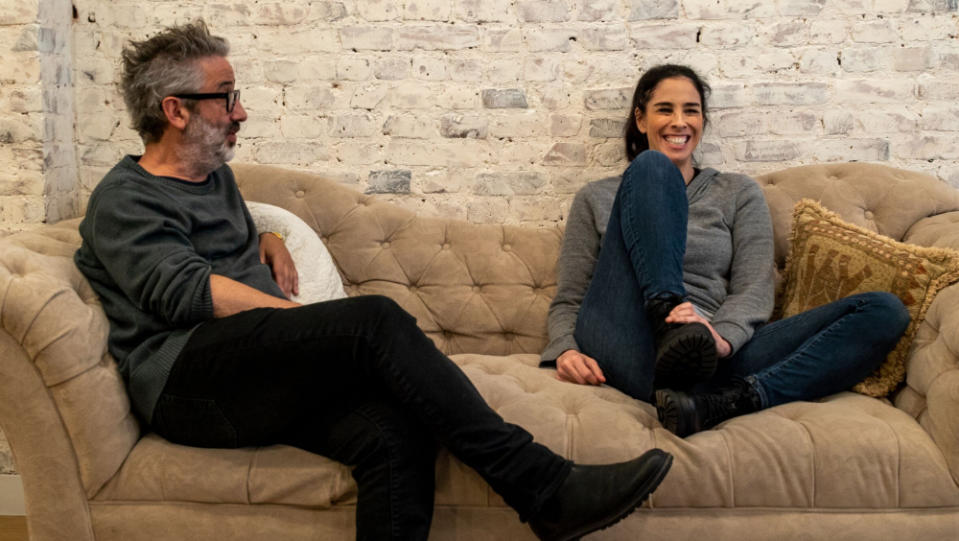David Schwimmer, Sarah Silverman and More Condemn Antisemitism in David Baddiel’s Documentary ‘Jews Don’t Count’
- Oops!Something went wrong.Please try again later.
- Oops!Something went wrong.Please try again later.

“Jews Don’t Count,” a new documentary from British writer and comedian David Baddiel set to air on U.K. broadcaster Channel 4 next week, is an examination of how, particularly in progressive circles, there is a persistent sense that Jews aren’t entitled to the same protection and support as other minority communities. That sense is predicated on the antisemitic belief that all Jews are rich, successful and “dominate” industries such as Hollywood, if not the very world order.
It’s symbolic of the catch-22 at the heart of the film that the succession of Jewish celebrities who appear within it to talk about their experiences of antisemitism, such as David Schwimmer, Sarah Silverman, Stephen Fry and Jonathan Safran Foer, may well end up further convincing antisemites that the very premise of the documentary is unfounded.
More from Variety
Real Life Mother-Daughter Duo Kate Winslet, Mia Threapleton in 'I Am Ruth' First Look
U.K. Prime Minister Rishi Sunak Could Drop Plans to Privatize Channel 4: Report
Baddiel, a comedian and writer, acknowledged that predicament at a press screening in London on Wednesday although he was ultimately sanguine about it. “I want [the documentary] not to just be seen by Jews,” he explained. “One very simple way of doing that, hopefully, is to have big names in it. It’s a pragmatic decision.”
Despite the starry guest list, when Variety asked whether there were any Jewish public figures who had declined to appear in the film, Baddiel replied “quite a lot.” Out of respect for their privacy, he didn’t reveal their names but said the list included “some quite prominent Jews who don’t want to bring their Jewishness to the fore and just don’t want to talk about this.”
“This” being the uncomfortable but important discussion about how antisemitism presents in the modern day. On the right, it has remained largely unchanged from the time of the Nazi Party in Europe and the Ku Klux Klan in the U.S. But in recent years antisemitism has also, to the surprise of many (not least Jews themselves), sprung up on the left and it’s here, as Baddiel demonstrates in the documentary, that it takes a more insidious form, firstly by shrouding itself in terms that, while not explicitly discriminatory, serve to exclude Jews alone from supposedly inclusive spaces, and secondly by declining to engage when Jews are subject to the kind of treatment that would arouse outrage on behalf of other groups (for example, inauthentic casting).
“Particularly over the last 20 years, with social media and all the rest of it, I think there’s been an incredible focus on trying to right wrongs, a lot of which has been good,” Baddiel said during the Q&A. “But some of which has been performative. And I think within the performative space, [in which] people [are] trying to make it clear that they are allies in a way that is more about their sense of self than about actual allyship, Jews have no currency for them.”
The documentary is based on Baddiel’s non-fiction book of the same name but the two are distinct projects. “The book is very personal piece of work,” he explained during the Q&A. “It’s me talking about my own experience of this particular phenomenon. [In the documentary] I can go speak to other Jews, and they can tell me whether or not they’ve experienced the same kind of thing. It turns out that this is something which, as Sarah Silverman says, a lot of Jews have been feeling for a long time, but maybe hasn’t been articulated before.”
“And I guess the other thing that the book can’t do is, you can feel things like the Colleyville incident, for example,” Baddiel continued, referring to the hostage crisis that took place at the beginning of this year, in which a young British man held up a Texas synagogue at gunpoint. Convinced of Jews’ power and influence, the hostage-taker selected the synagogue at random to demand that an unaffiliated (and bewildered) rabbi in New York order the release of an inmate and alleged al-Qaeda operative from Fort Worth.

The rabbi, Angela Buchdahl, also makes an appearance in “Jews Don’t Count.” “The way we’ve rendered it, you can feel what that’s like for [her] suddenly being cast as this ridiculous stereotype of Jewish power that she’s got four people’s lives in her hands,” Baddiel said.
He also shows how Jewish schools in the U.K. participate in active shooter drills, an exercise almost unheard of in Britain, connecting it with festering antisemitism on all sides of the political divide.
Despite the sober subject matter, audiences may be surprised to find that “Jews Don’t Count” also has plenty of laughs (at one point Silverman proclaims “I love money!” before acknowledging this documentary probably isn’t the best place to say that out loud). “It’s part and parcel of a Jewish tradition that when you talk about trouble and awful things, you also try and be funny about it,” Baddiel said.
The documentary also sees Baddiel, who came to fame as a comedian, grapple with antisemitism in the industry. The film examines “Bo’ Selecta!,” a British sketch show from the early 2000s which saw comedian Leigh Francis dress up as a number of public figures including Black (and Jewish) musician Craig David, for which Francis donned Blackface. Francis also caricatured Baddiel in the show, portraying him with a hook nose, long curly sidelocks (which Baddiel has never worn) and thick accent. It was a portrayal a friend of Baddiel’s apparently found so appalling he suggested it constituted a hate crime.
In 2020 Francis released a video apologizing for portraying Black celebrities including David and Michael Jackson. Baddiel, however, did not receive an apology from Francis. “I don’t like calling out other comedians. We’re comedians and it’s weird to do that. But in this particular case, it’s such a clear example of the selective outrage in the sense that, as far as I’m aware, no one has ever drawn any attention to that [lack of apology],” Baddiel said during the Q&A. He also revealed that Francis had declined a request to appear in “Jews Don’t Count.”
During the Q&A, Baddiel also discussed Dave Chappelle’s SNL monologue about Kanye West, which took place just a few days earlier. “I love Dave Chappelle, he’s a brilliant comedian,” Baddiel said but added that he had found the SNL monologue “weird.” “Dave Chappelle was basically saying, ‘Look, Kanye is right. We can’t say out loud, but Kanye was right, because look what’s happened to him,’” Baddiel said, referring to the many brands that had cut ties with West following his litany of public antisemitic comments, including a threat to “go death con 3 on Jewish people [sic].”
“There are consequences, like there are [in the case of] all other minorities, when people say racist or discriminatory things,” Baddiel said. “But with Jews, those consequences seem to be indicative of Jewish power.”
One of the most powerful moments in “Jews Don’t Count” is when Baddiel tackles his own racist caricature of Black British footballer Jason Lee during a ‘90s BBC sketch show called “Fantasy Football League.” In the show Baddiel appeared in Blackface as Lee with a pineapple on his head while his co-host, Frank Skinner, played Lee’s manager.
Baddiel has apologized publicly a number of times for the sketch but had never met Lee in person. In the documentary, he appears as a guest on Lee’s podcast, “AbsoluteLee,” during which he apologizes again. The duo then have a discussion of both racism and antisemitism. During the Q&A, Baddiel revealed that, although it’s not shown in the doc, he apologized to Lee again before leaving the podcast studio. “I just went up to him again, and said, ‘I’m sorry, again.’ And he just went, ‘It’s done now.’ And shook my hand.” The experience, Baddiel said, was difficult but one he was grateful for. “I’m very glad I’ve done it.”
Ultimately “Jews Don’t Count” ends on a hopeful note. “I do think that the dial is shifting, I say that at the end of the film,” Baddiel said. “I think things have definitely moved on from when I wrote the book. Hopefully, the film will make people just think about it.”
Best of Variety
Sign up for Variety’s Newsletter. For the latest news, follow us on Facebook, Twitter, and Instagram.

